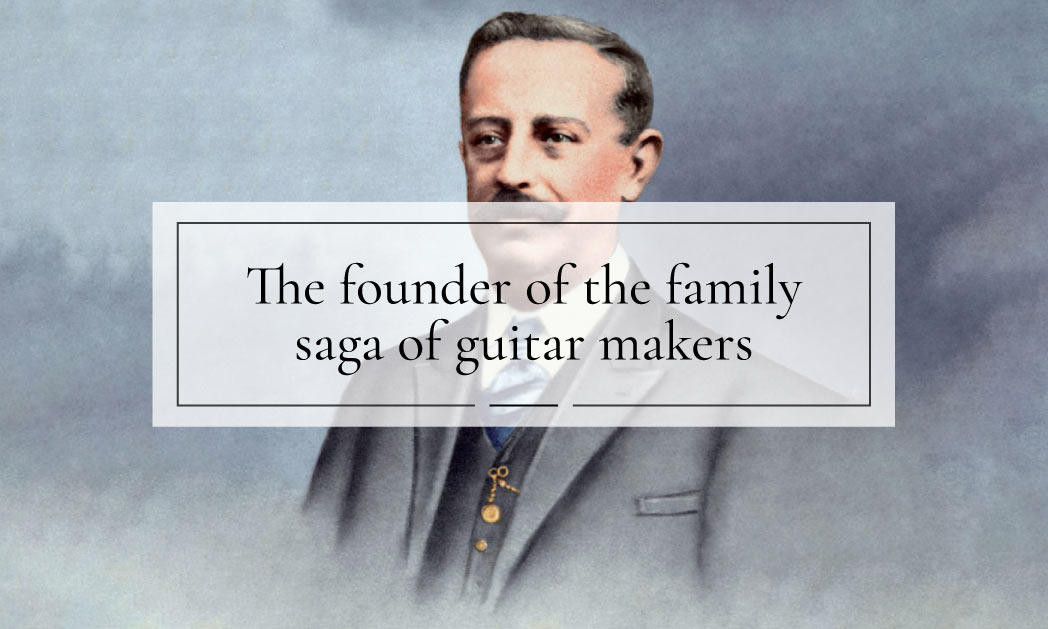When I talk about the founder of our family saga of guitar makers, my great-grandfather José Ramírez I, I like to refer to him as the great-great-grandfather, because in short he is the great-great-grandfather of my nephews, and because great-great-grandfather is a word that I like very much, it is more forceful than the word great-grandfather and, besides, as I like to tell my nephews and nieces, it is a privilege to have a great-great-grandfather of whom one can tell anecdotes, thus preventing him from falling into oblivion and letting him live in the memory of those who hear them, or of those who read them, as I intend to achieve with this writing.
For me, seeing his photograph is not just about a countenance not lacking in gentleness and a noble gaze, but it allows me to guess something deeper through the snippets of a latent story behind those eyes, a story that gives him content and through which his soul is glimpsed and makes it easy to get attached to him. And if my father hadn’t told me a few things about him, I would never have guessed that he had such a bad character.
I think the great-great-grandfather was a hopeless romantic, if only because he used to say that the guitar maker who didn’t die in a charity hospital didn’t have the money to get there. To love a profession to such an extent, especially when his father was well off, is significant enough to refer to him as a romantic character. And there are anecdotes about him to back up this attribute.
Anecdotes from the great-great-grandfather
It was at the end of the 19th century and the beginning of the 20th century when a certain gentleman stationed at the door of his guitar shop had managed to become little less than the terror of the tram drivers. He was the great-great-grandfather. Those were the times of transition from horse-drawn carriages to trams. The entrance to Calle Concepción Jerónima, where the guitar shop was located – which, incidentally, many have called the sanctuary of the guitar – and which was in reality a crossroads, had become a theatre of war between tram drivers and carters.
Because of that traditional bad temper that some of us display when we are behind the wheel, it was quite common for many tram drivers, when they saw that a horse-drawn cart was going to meet them at the crossroads, to maintain their trajectory, blocking the way of the carters. A tram could brake, but not reverse, while a cart could reverse, but with a lot of apparatus and complicated manoeuvres.
But it turned out that the great-great-grandfather had sided with the draymen. And no streetcar driver dared to cross the conflictive junction blocking the path of a drayman if the great-great-grandfather was present.
I can imagine the great-great-grandfather leaning against the door jambs of his shop-workshop watching the world and life and, above all, the crossing to see the tram and the cart coming, and then lighting up like a fire, with that serious face of his, perhaps waving his arms or opening them dramatically wide, in the typical gesture of “they won’t pass” or “over my dead body” in front of a tram, even arguing with its driver heatedly if necessary and almost coming to blows, while around him a circle of onlookers formed, betting on one or the other and perhaps fighting among themselves to liven up the scene.
And in any case I can imagine that it would be an intense enough experience for the tram drivers and so they must have opted to give up the perverse practice of annoying the carter.
I do not know what dark frustrations he would mercilessly vent on the tram drivers, nor what delightful satisfaction he would derive from seeing the expression on the faces of the victorious carters whom he so vehemently defended. Nor do I know what dark frustrations I would mercilessly unload on the priest in the sacristy or what delightful satisfaction I would feel in seeing the expression on the faces of the victorious parents of the children ready for baptism whom I so vehemently defended. What I do know is that it had to be a most effective therapy.
Why did he take it with the priests at baptisms?
Let us imagine a baby who had just come to this good land and strange world without having any idea of what awaited him. Because it was not enough to be born, irremissibly, with original sin, but in order to cleanse it, one had to undergo baptism, which in turn had to be paid for. And if it was not paid for, because the parents did not have the means, then the priest would very piously register the child in the church archives as “solemnly poor”, leaving him no hope of escaping that destiny prefixed on a piece of paper.
The first time the great-great-grandfather sponsored one of these children he was able to change the course of his destiny, or at least open a door to brighter horizons, because such was the tremendous argument he had with the parish priest in the sacristy to stop him from marking the baby with such a stamp, He achieved his purpose not only for that child, but for all those he later sponsored, for when word spread of the ferocity with which the neighbourhood guitar maker defended his godson, he became the godfather of most of those born in his parish.
Because every time the priest saw the great-great-grandfather at the head of the baptismal procession, in order to avoid a row, he agreed in advance to leave the baby free to choose a more encouraging future than that of the solemn poverty inscribed with his name in the sacristy archives. Thus the great-great-grandfather became the godfather, but in the good sense of the word, of his parish.
So the great-great-grandfather not only defended the carters and sponsored most of the children in his parish, but also survived the Spanish flu, was a freemason – something quite common among those who exercised a profession in those times – changed century and also, without knowing it, started a generational chain of guitar makers that is now in its fifth generation. And all in love with what we do. What more could you ask for from a great-great-grandfather?
Article written by Amalia Ramírez


